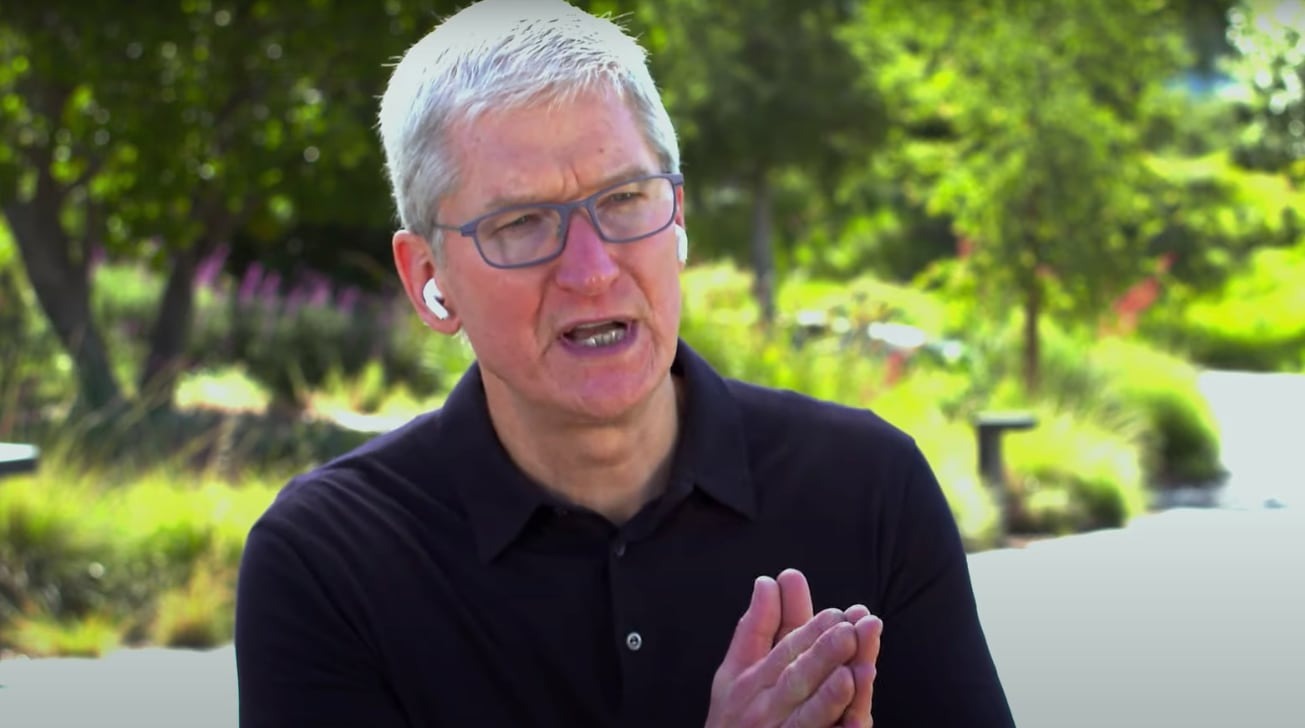The full pre-WWDC interview with Apple CEO Tim Cook has aired, with the corporate chief offering few clues about what to expect as well as discussing the need for the iPhone maker to be socially aware, the impact of COVID-19, and tax payments.
Following an initial tease of the full-length interview with CBS Sunday Morning on Saturday, Sunday's eight-minute video with Tim Cook covers a few subject areas that are both important and timely to the company.
The interview starts off by discussing the more immediate future, with talk about Monday's WWDC 2020 keynote. "I'm full of secrets and it's hard not to overflow right now. But I've been trained well!" Cook joked in the social distancing-compliant interview setup.
Briefly explaining that WWDC is beneficial to both consumers and developers, Cook suggests how he benefits from the event. "If you're somebody like me that sort of steps back and looks at it all, you see the intersection of technology and the liberal arts, and it really makes your heart sing."
Turning to the giant size of Apple and its $1.4 trillion market capitalization, Cook was asked what the role of the CEO is in a large-scale socially-responsible company. Cook admits to never subscribing to the idea of a CEO focusing just on profits, and instead looking towards the "constituencies."
Social Responsibility
On the sensitive topic of the George Floyd incident, which was captured on a smartphone camera and led to global protests, Cook is asked if he reflected on the role the iPhone played in the ability for citizens to record historic moments like that.
"We are humbled by it," Cook started, pointing out how "some of the most dramatic societal changes have occurred because someone captured video," such as with events in Birmingham and Selma. "The thing that has changed though, and we're very proud of this, is that we put a camera in everybody's pocket," he continued, "and so it becomes much tougher as a society, I believe, to convince themselves that it didn't happen, or that it happened in a different manner or whatever it might be."
Moving to Cook's upbringing in Robertsdale, Alabama, he talks about his first experience with racism, which he remembers "as if it were yesterday." It was seeing doors marked "whites only," and failing to understand "how people could convince themselves that this was right."
"I do believe, optimistically, this is one of those moments that we could make significant progress," Cook continued. "For so many things it seems like there's such slow progress, and then all of the sudden, there's a giant leap." When asked if he wants to make the leap bigger, Cook agrees stating "That's exactly right."
Speaking about the recent Supreme Court decision stating there should not be any discrimination against people based on their gender or orientation, Cook admits he is "incredibly grateful for their opinion," and he applauds the justices "who stood up and did that."
Cook's discussions with President Donald Trump was also raised, and was revealed on Saturday as part of promotion for the interview.
Taxes and COVID-19
When the interviewer brought up the need for social responsibility and Cook's fiduciary duty for Apple to pay as little tax as possible, Cook offers the usual response of "our responsibility is to pay what we owe, just plain and simple."
Pressed further, with the suggestion that paying what's owed is the standard, Cook is asked if there is a way in how the value proposition operates in relation to paying taxes. Cook answers by stating "we do a lot more than pay taxes."
"We turned the company upside-down to help the world on COVID, and donated all of that, hundreds of millions of dollars," Cook advises. "And so, I think my own view is, you pay what you owe in taxes, and then you give back to society. And Apple is clearly doing that."
COVID-19's effect on working life has become Cook's biggest challenge at the moment, in that many employees are working from home instead of working at Apple Park. "The thing that I worry that we'll be missing is the serendipity that we all count on. And for that reason I can't wait until we're all back together," Cook admits.
In dealing with the virus and the issues it throws up, Cook is asked what it's like to manage products and employees in such an uncertain world. Pointing out people generally disliking uncertainty "as a general rule," Cook suggests he knows "very few people that thrive on uncertainty," and that they try to make things more certain by estimating where things are going.
"And we have done all of those things, I would tell you," Cook concludes. "But the most important thing for us is, we viewed it as a challenge to overcome."
 Malcolm Owen
Malcolm Owen








 Andrew Orr
Andrew Orr
 Wesley Hilliard
Wesley Hilliard

 Oliver Haslam
Oliver Haslam
 Christine McKee
Christine McKee
 Amber Neely
Amber Neely









